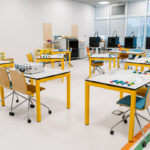
Top Training on 5S: Mastering Lean Principles for Efficiency
April 24, 2025
3 Powerful Ways to Use a Lean Manufacturing Game in Training
April 24, 2025Top Teamwork Trainings to Boost Collaboration in Your Workplace
Curious how to improve your team’s collaboration and effectiveness? Teamwork trainings offer strategies and tools to enhance communication, resolve conflicts, and build trust. In this article, discover effective teamwork trainings that can transform your team dynamics.
Key Takeaways
- Essential teamwork skills like communication, empathy, and conflict resolution are crucial for fostering collaboration and enhancing team dynamics.
- Investing in teamwork training and courses leads to high-performing teams by promoting trust, creativity, and effective communication.
- Creating a psychologically safe work environment empowers team members to express themselves, leading to innovation, improved performance, and employee engagement.
Essential Teamwork Skills Every Employee Should Learn

Strong teams are built through consistent and focused teamwork trainings.
Every successful team is built on a foundation of essential teamwork skills. These skills enable team members to communicate effectively, resolve conflicts, and collaborate towards common goals. One of the most critical skills is communication. Encouraging team members to pair up and reflect meaningfully can significantly improve their communication skills and enhance team communication, allowing team members learn from each other. Activities like the ‘3 Question Mingle’ help team members get to know each other and promote open dialogue. Additionally, developing team skills is vital for fostering a cohesive environment.
Empathy is another crucial skill for effective teamwork. Improving empathy can be achieved through activities like the ‘Heard, Seen, Respected’ exercise, which helps team members understand and appreciate each other’s perspectives. Sharing personal experiences during activities like ‘Best and Worst’ can also foster a greater understanding and mitigate conflicts.
Conflict resolution is essential for maintaining team cohesion. Conflicts often arise from personality clashes and differing work styles, but with the right skills, these can be resolved constructively. Activities like the ‘Life Map’ encourage deeper sharing, leading to stronger team bonds and effective conflict resolution.
Listening is a fundamental aspect of effective teamwork. The ‘Team of Two’ exercise emphasizes the importance of active listening to improve team interactions and resolve conflicts. Similarly, the ‘Count Up’ exercise demonstrates the value of attentive listening in team settings.
Clear communication and collaboration are developed during the ‘Human Knot’ activity, which helps team members work together to resolve conflicts and strengthen their bonds. Developing these essential skills enables your team to tackle common challenges and improve both collaboration and performance.
Teamwork trainings to Enhance Team Dynamics

Every piece counts – just like every person in teamwork trainings.
Investing in teamwork training courses can significantly enhance team dynamics and overall performance. One such course is ‘Leading More Effective Teams’ at Harvard Business School, which utilizes interactive simulations and case studies to provide participants with actionable strategies and tools. These immersive learning experiences help team members apply theoretical knowledge to real-world scenarios, bridging the gap between learning and practice.
Stanford’s ‘Managing Teams for Innovation and Success’ course focuses on leveraging team dynamics for innovation through practical exercises. This course encourages participants to explore diverse perspectives and develop creative solutions to complex problems. Similarly, Wharton’s program emphasizes effective communication and fostering collaboration to drive team performance.
INSEAD’s course offers insights for leading diverse teams through a mix of theoretical learning and peer feedback. This approach helps leaders understand the unique challenges of managing diverse teams and equips them with the skills to foster inclusivity and collaboration. MIT’s course on innovative organizations equips leaders with strategies to promote innovation within teams, further enhancing team dynamics.
Columbia Business School’s course helps leaders inspire their teams and navigate complex team dynamics. Investing in these courses helps organizations cultivate high-performing teams skilled in communication, collaboration, and innovation.
Building Trust Within Teams
Building trust within teams is vital for fostering collaboration and improving overall performance. Mutual trust is essential for group collaboration and a strong company culture. Regular, effective feedback helps build constructive relationships among team members, enhancing trust and openness.
Leaders play a pivotal role in establishing trust by fostering transparent communication and authentic relationships. Training programs focused on authentic leadership can equip leaders with the necessary skills to build trust effectively. Maintaining trust by being open about goals and encouraging honesty in team settings is recommended for improving trust.
Structured storytelling processes, like the ‘Telling Our Stories’ activity, help team members develop relations, trust, and openness. Creating trust cards can help define trust characteristics and build understanding among team members. The ‘Trust Battery’ activity reflects on trust levels among team members and enhances collaboration.
Exploring alignment within the team and discussing future actions is crucial for building trust. Implementing these strategies fosters a culture of trust, improving collaboration and decision-making.
Effective Communication Strategies for Teams
Effective communication is the cornerstone of successful teamwork. Teamwork training can significantly improve communication skills, which are vital for effective collaboration. Open communication among team members enhances trust and improves conflict resolution.
Encouraging open-ended questions during team discussions can help everyone feel valued and promote collaboration. Courses often include practical activities and real-time feedback to enhance communication skills. Learning how to visualize complex data can also significantly improve communication effectiveness.
Emotional intelligence is critical for understanding and managing emotions within teams, which enhances overall team performance. Training programs focused on emotional intelligence can significantly improve communication and relationship dynamics among team members.
Leadership communication encompasses various formats, including speeches, meetings, and written communication. Managers should foster open and clear communication among team members to address conflicts effectively.
Cultural Diversity in Team Collaboration

Successful collaboration starts with quality teamwork trainings.
Cultural diversity significantly enriches team collaboration and enhances creative problem-solving. The course ‘Leading Culturally Diverse Teams in the Workplace’ focuses on cultural diversity and cross-cultural management, providing participants with the skills to navigate and leverage diversity in team settings.
Activities in the course include virtual training activities, videos, articles, and practical assignments to foster inclusive communication. Completing this course provides a certificate and acknowledges the importance of diversity (or lack thereof) in team settings.
Embracing cultural diversity allows teams to leverage a broader range of perspectives and experiences, enhancing collaboration and innovation.
Creative Problem Solving and Innovation
Creative problem-solving skills are vital for teams to collaboratively analyze challenges and develop effective solutions. Training in creative thinking equips teams to overcome complex challenges and devise innovative solutions. Participants learn to reshape their thinking to explore possibilities rather than limitations.
Effective training cultivates a culture that encourages collaboration and values creative input from all team members. The curriculum often includes techniques to foster brainstorming and redefine problems to inspire innovative thinking.
Leaders attending creative thinking training gain practical tools for implementing innovative strategies in their organizations. Teamwork fosters a supportive network that can facilitate the generation of new ideas and innovative solutions.
Conflict Resolution Techniques
Knowing how to manage conflicts constructively is essential for turning disagreements into growth opportunities. Identifying points of agreement and disagreement helps in creating effective conflict resolution strategies. Conflict resolution is addressed openly in high-performance teams, transforming potential challenges into opportunities for growth and understanding.
Constructive conflict resolution can enhance team relationships and reinforce cohesion. Respectful conflict management is crucial for fostering a culture of psychological safety within teams. In a diverse workplace, sensitivity training can reduce conflicts and foster better communication.
Teams characterized by high emotional intelligence are better equipped to handle conflict and stress effectively, showcasing their ability and having a profound effect. Providing a cooling-off period can aid in managing conflicts by allowing team members to reflect before discussions.
Enhancing Emotional Intelligence in Teams
Emotional intelligence involves recognizing one’s own and others’ emotions, fostering a supportive team culture. Empathy and emotional intelligence are crucial skills for leaders when handling team conflicts. Mindfulness practices can enhance emotional intelligence in teams, improving interpersonal relationships, self awareness, and work engagement.
Psychological safety enables team members to take risks and express themselves without fear of negative consequences, fostering engagement and innovation. Enhancing emotional intelligence helps teams build stronger relationships and improve both collaboration and performance.
Training programs focused on emotional intelligence can significantly improve communication and relationship dynamics among team members. Leaders who demonstrate high emotional intelligence can inspire their teams and navigate complex team dynamics effectively.
Boosting Employee Engagement and Retention
Training focused on collaboration can enhance employee commitment and reduce turnover. Empowerment within teams facilitates decision-making and enhances member engagement in achieving collective objectives. Investing in teamwork training can lead to higher employee morale and job satisfaction.
Engaged employees are more likely to contribute positively to team dynamics and organizational goals. Such training can significantly enhance employee satisfaction and productivity by fostering an inclusive workplace.
Emotionally intelligent leaders foster a positive work environment that supports team cohesion and individual well-being. Implementing these strategies can significantly boost employee engagement and retention.
Developing High-Performing Teams
High-performance teams are distinguished by their shared commitment to goals, collaborative spirit, and a focus on performance excellence. These successful teams thrive on open communication, clear role expectations, and mutual accountability among members. They often include diverse skill sets that complement one another, enhancing overall team effectiveness.
Programs focused on leadership communication teach how to engage and inspire through effective messaging. Effective leadership is crucial in high-performance teams, focusing on maintaining team relevance and fostering commitment.
Regular evaluation and shared recognition of successes contribute to a supportive atmosphere that fosters high performance for the entire team. Investing in teamwork enhances accountability among team members and motivates them to exceed expectations.
Benefits of Teamwork Training for Organizations

Successful collaboration starts with quality teamwork trainings.
Effective teamwork enhances operational efficiency by enabling quicker task completion through collaboration. Employees in high-trust workplaces report significantly higher levels of energy and productivity compared to those in low-trust environments. Collaboration among team members and colleagues helps to collaborate effectively in tackling complex problems, providing faster and better solutions. This is essential for effective team collaboration.
Teamwork helps create an organization achieve more creative thinking, productivity, and efficiency. A high level of trust in organizations leads to safer environments where employees can express themselves and take risks. Creating a positive workplace culture can help minimize the frequency of conflicts among team members.
A positive team environment created through teamwork training can increase job loyalty and provide a benefit. A well-trained team member is capable of achieving higher quality outputs through collective efforts and shared knowledge, fostering team trust.
Flexible Learning Options for Team Training
Training programs can be delivered through various formats to suit different learning preferences and schedules. In-person instruction incorporates micro-lectures, group projects, and exercises for practical application. This format allows for immediate feedback and hands-on learning, making it ideal for those who thrive in interactive environments.
Virtual courses offer the flexibility to engage with the same content as in-person classes from any location. These courses often include live sessions, recorded lectures, and interactive discussions, providing a comprehensive learning experience. Self-study options enable learners to progress at their own speed using books and videos, making it a convenient choice for busy professionals.
The available formats for the Team Building Training Course include face-to-face, online, or hybrid. The Corporate Team Building course follows bite-sized lessons that include images and video clips, with a quiz at the end to reinforce learning. Offering flexible learning options ensures all team members have the opportunity to develop essential teamwork skills.
Maintaining Team Cohesion Over Time
Maintaining team cohesion over time is crucial for long-term success. Ongoing cultural diversity training is essential to maintain inclusivity and should be revisited regularly. Teamwork training fosters a sense of belonging among employees, leading to higher retention rates.
Engaging in regular team-building activities can significantly strengthen relationships and morale. These activities help team members connect on a personal level, fostering trust and collaboration. Structuring clear and transparent goals helps team members understand their responsibilities and align with the team’s objectives.
Recognizing and celebrating team successes collectively fosters a sense of belonging and shared achievement. Defining and communicating the team’s shared values promotes unity and direction among members. Fostering teamwork by empowering team members through assigned responsibilities increases their investment in team outcomes to achieve common goals.
Implementing these strategies helps organizations maintain team cohesion, ensuring continued effective collaboration and achievement of common goals.
Promoting Psychological Safety in Teams

Virtual teamwork trainings – anytime, anywhere, any team.
Promoting psychological safety in teams is vital for fostering a collaborative and innovative work environment. Leaders can enhance psychological safety by prioritizing their team’s mental well-being through regular supportive check-ins. Modeling vulnerability and trust by sharing personal challenges can strengthen team cohesion and safety.
Psychological safety is essential in teams as it allows members to express ideas, ask questions, and raise concerns without fear of negative consequences. A psychologically safe environment fosters collaboration and improves overall team performance by encouraging creativity and innovation.
Promoting psychological safety allows leaders to create a work environment where team members feel valued and supported, resulting in stronger teams and better organizational outcomes.
Summary
In summary, investing in teamwork training is a powerful way to boost collaboration and drive success in your workplace. Essential teamwork skills such as communication, empathy, and conflict resolution are the building blocks of effective team collaboration. Activities like the ‘3 Question Mingle’ and ‘Life Map’ can help team members develop these crucial skills.
Various training courses from prestigious institutions like Harvard, Stanford, and INSEAD offer valuable insights and practical tools for enhancing team dynamics. Building trust within teams through structured storytelling and feedback processes is essential for fostering a culture of collaboration and openness.
Effective communication strategies, including open-ended questions and emotional intelligence training, are vital for team success. Embracing cultural diversity and creative problem-solving techniques can lead to innovative solutions and stronger team collaboration. Conflict resolution strategies and enhancing emotional intelligence further contribute to a cohesive and high-performing team.
Boosting employee engagement and retention through teamwork training can lead to higher job satisfaction and productivity. Developing high-performing teams requires a focus on shared goals, open communication, and mutual accountability. The benefits of teamwork training for organizations are immense, including improved operational efficiency, creativity, and job loyalty.
Flexible learning options ensure that all team members can develop essential teamwork skills at their own pace. Maintaining team cohesion over time and promoting psychological safety are crucial for long-term success. By implementing these strategies, organizations can create a collaborative, innovative, and high-performing work environment.
Are you ready to transform your workplace and unlock the full potential of your team? Start investing in teamwork training today and watch your organization soar to new heights. Below is a preview of my training on the principles of teamwork. This is the first general video from the presentation. I warmly invite you to sign up for the full course! You’ll get lifetime access to all materials. You can join the course here:
Frequently Asked Questions
What are the essential teamwork skills every employee should learn?
To thrive in teamwork, focus on developing effective communication, empathy, conflict resolution, and active listening. Engaging in activities like ‘3 Question Mingle’ and ‘Life Map’ can significantly enhance these skills and strengthen your collaborative abilities.
How can training courses enhance team dynamics?
Training courses can significantly enhance team dynamics by equipping team members with effective communication, collaboration, and innovative strategies. Embrace these opportunities to foster a more cohesive and productive team environment!
Why is building trust within teams important?
Building trust within teams is crucial because it enhances collaboration and boosts overall performance. By engaging in regular feedback and trust-building activities, you create an environment of openness that drives success.
What are some effective communication strategies for teams?
To boost your team’s performance, embrace open communication, ask open-ended questions, and develop emotional intelligence. Implementing these strategies will strengthen trust and improve conflict resolution within your team!
How does promoting psychological safety benefit teams?
Promoting psychological safety empowers team members to share ideas and concerns freely, which ultimately enhances collaboration and sparks creativity. This creates a stronger, more innovative team dynamic that drives success.


